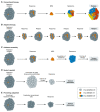Cancer evolution: Darwin and beyond
- PMID: 34459009
- PMCID: PMC8441388
- DOI: 10.15252/embj.2021108389
Cancer evolution: Darwin and beyond
Abstract
Clinical and laboratory studies over recent decades have established branched evolution as a feature of cancer. However, while grounded in somatic selection, several lines of evidence suggest a Darwinian model alone is insufficient to fully explain cancer evolution. First, the role of macroevolutionary events in tumour initiation and progression contradicts Darwin's central thesis of gradualism. Whole-genome doubling, chromosomal chromoplexy and chromothripsis represent examples of single catastrophic events which can drive tumour evolution. Second, neutral evolution can play a role in some tumours, indicating that selection is not always driving evolution. Third, increasing appreciation of the role of the ageing soma has led to recent generalised theories of age-dependent carcinogenesis. Here, we review these concepts and others, which collectively argue for a model of cancer evolution which extends beyond Darwin. We also highlight clinical opportunities which can be grasped through targeting cancer vulnerabilities arising from non-Darwinian patterns of evolution.
Keywords: cancer; cancer evolution; cancer therapy; tumour heterogeneity.
© 2021 The Authors. Published under the terms of the CC BY 4.0 license.
Conflict of interest statement
K.L. has a patent on indel burden and CPI response pending and speaker fees from Roche tissue diagnostics, research funding from CRUK TDL/Ono/LifeArc alliance, and a consulting role with Monopteros Therapeutics. C.S. acknowledges grant support from Pfizer, AstraZeneca, Bristol Myers Squibb, Roche‐Ventana, Boehringer‐Ingelheim, Archer Dx Inc (collaboration in minimal residual disease sequencing technologies) and Ono Pharmaceuticals, is an AstraZeneca Advisory Board member and Chief Investigator for the MeRmaiD1 clinical trial. C.S. has consulted for Amgen, AstraZeneca, Bicycle Therapeutics, Bristol Myers Squibb, Celgene, Genentech, GlaxoSmithKline, GRAIL, Illumina, Medixci, Metabomed, MSD, Novartis, Pfizer, Roche‐Ventana and Sarah Cannon Research Institute. C.S. has stock options in Apogen Biotechnologies, Epic Biosciences, GRAIL, and has stock options and is co‐founder of Achilles Therapeutics. C.S. holds patents relating to assay technology to detect tumour recurrence (PCT/GB2017/ 053289); to targeting neoantigens (PCT/EP2016/059401); identifying patent response to immune checkpoint blockade (PCT/EP2016/071471); determining whether HLA LOH is lost in a tumour (PCT/GB2018/052004); predicting survival rates of cancer patients (PCT/GB2020/050221); to treating cancer by targeting insertion/deletion mutations (PCT/GB2018/051893); identifying insertion/deletion mutation targets (PCT/GB2018/051892); methods for lung cancer detection (PCT/US2017/028013); and identifying responders to cancer treatment (PCT/GB2018/051912).
Figures



References
-
- Abbosh C, Birkbak NJ, Swanton C (2018) Early stage NSCLC — challenges to implementing ctDNA‐based screening and MRD detection. Nat Rev Clin Oncol 15: 577–586 - PubMed
-
- Albain K, Anderson S, Arriagada R, Barlow W, Bergh J, Bliss J, Buyse M, Cameron D, Carrasco E, Clarke Met al (2012) Comparisons between different polychemotherapy regimens for early breast cancer: meta‐analyses of long‐term outcome among 100 000 women in 123 randomised trials. Lancet 379: 432–444 - PMC - PubMed
Publication types
MeSH terms
Grants and funding
- DH_/Department of Health/United Kingdom
- 20466/CRUK_/Cancer Research UK/United Kingdom
- 17786/CRUK_/Cancer Research UK/United Kingdom
- C11496/A30025/CRUK_/Cancer Research UK/United Kingdom
- 30025/CRUK_/Cancer Research UK/United Kingdom
- FC001169/CRUK_/Cancer Research UK/United Kingdom
- MR/V033077/1/MRC_/Medical Research Council/United Kingdom
- 25253/CRUK_/Cancer Research UK/United Kingdom
- FC001169 /MRC_/Medical Research Council/United Kingdom
- C69256/A30194/CRUK_/Cancer Research UK/United Kingdom
- FC001169/WT_/Wellcome Trust/United Kingdom
LinkOut - more resources
Full Text Sources
Other Literature Sources
Medical

